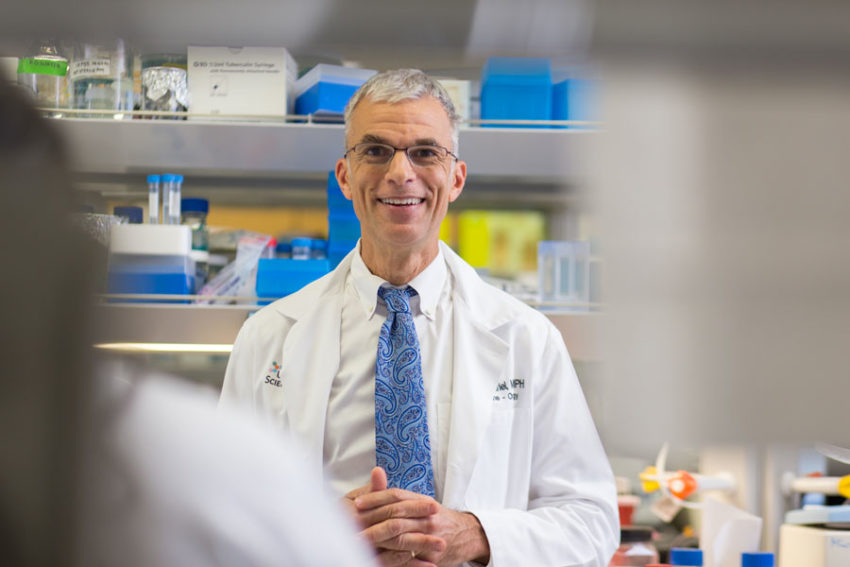Tyler J. Curiel, M.D., M.P.H., of the Joe R. and Teresa Lozano Long School of Medicine at UT Health San Antonio, has been awarded a five-year, $3.3 million Provocative Questions grant by the National Cancer Institute.
Dr. Curiel and his colleagues seek to optimize the effectiveness of immune-checkpoint drugs in treating melanoma and other cancers.
The work is at the leading frontiers of cancer immunotherapy. A Provocative Questions grant provides support for only the most daring, out-of-the-box ideas and is rarely given by the NCI. It’s the second such award for Dr. Curiel. He joined The University of Texas Health Science Center, now called UT Health San Antonio, in 2006.
Cancer cells express a protein called PD-L1 (programmed death-ligand 1). This protein inhibits anti-tumor T cells, protecting tumors from immune elimination.
Immune-checkpoint molecules are an emerging class of drugs that block this inhibition, resulting in successful treatment of many cancers. The drugs include anti-PD-L1 antibodies. These agents are very new; some were federally approved just this year for human use.
Dr. Curiel’s lab found that PD-L1 regulates more than 1,200 tumor genes, a plethora that explains why current markers to predict patient outcomes are not very accurate.
“With the Provocative Questions funding, we will continue to fill major knowledge gaps in the mechanisms of PD-L1 antibodies – how they interact with tumors,” Dr. Curiel said.
“We have turned the field on its head by showing novel mechanisms of action for these important anti-cancer drugs, which leads to insights into why the drugs work or fail and should help improve their clinical use,” he said.
The ultimate goal is to develop new and more-effective treatment strategies and better means to predict who can and cannot benefit from treatments.
The multi-institutional research team is establishing clinical trials of immune-checkpoint molecules and will test them in cancer patients at UT Health Cancer Center in late 2017 or early 2018, Dr. Curiel said.
Melanoma and ovarian cancer will be the initial focus because of the team’s expertise and other factors, but Dr. Curiel believes the studies will lead to better treatment combinations for many different cancers.
Dr. Curiel is a professor of medicine (hematology-oncology) and professor of microbiology, immunology and molecular genetics at UT Health San Antonio. He is a member of the UT Health Cancer Center, which is a National Cancer Institute-designated Cancer Center, and occupies the Daisy M. Skinner President’s Chair in Cancer Immunology at UT Health.
Grant collaborators include Mary Jo Turk, Ph.D., of the Geisel School of Medicine at Dartmouth College; Curtis Clark, M.D.-Ph.D. student; Harshita Gupta, Ph.D, postdoctoral fellow; and Vincent Hurez, Ph.D., research scientist, all of the Curiel laboratory; Rong Li, Ph.D., professor of molecular medicine at UT Health; and Ratna Vadlamudi, Ph.D., professor of obstetrics and gynecology and cell systems and anatomy, UT Health.


